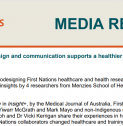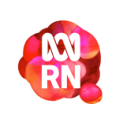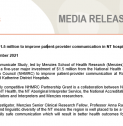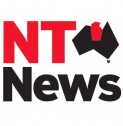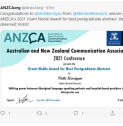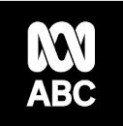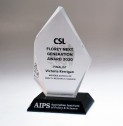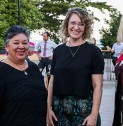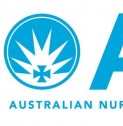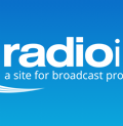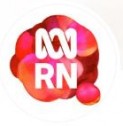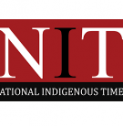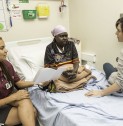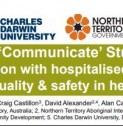The Communicate Study: partnership across the Top End to improve First Nations patients’ experience and outcomes of healthcare
The vision of the Communicate Study Partnership is to ensure more First Nations patients receive culturally safe healthcare, to ensure better health outcomes.
Training opportunities
We offer evidence-based intercultural communication training and workshops tailored for healthcare professionals. Our training focuses on developing skills in critical reflection and culturally safe communication.
Workshops are co-facilitated by First Nations and non-Indigenous facilitators, providing a dynamic learning experience that models best practice in intercultural communication.
Learn more: Download our information sheet or contact us at communicatestudypartnership@menzies.edu.au.
Workshops are co-facilitated by First Nations and non-Indigenous facilitators, providing a dynamic learning experience that models best practice in intercultural communication.
Learn more: Download our information sheet or contact us at communicatestudypartnership@menzies.edu.au.
Research activities:
Our research aims to improve the cultural safety of institutions and healthcare providers by:
- Developing, implementing and evaluating innovative communication and cultural safety education packages, inspired by the award-winning podcast: Ask the Specialist: Larrakia, Tiwi and Yolngu stories to inspire better healthcare.
- Creating a community of practice of culturally safe clinicians, supported by a social media chat group and seminars provided by invited experts
- Improving the supply, demand and effectiveness of Aboriginal language interpreters through developing, evaluating and implementing new models of working with Aboriginal language interpreters in healthcare.
This is a multi-level partnership between Menzies School of Health Research, NT Health, the NT Aboriginal Interpreter Services (AIS), National Accreditation Authority for Translators and Interpreters (NAATI), the Djalkiri Foundation and First Nations leaders, health professionals and educators in the NT
Chief investigator:
Postdoctoral researcher:
Project Manager:
Key Staff
- Tiana Alley
- Emily Armstrong
- Anna Lucas
- Madelyn Hay
- Joanne Sweeney
Information for study participants:
- The dynamic Communicate study team has forged collaborations with NT Health, NT Aboriginal Interpreter Service (AIS), National Accreditation Authority for Translators and Interpreters (NAATI), the Djalkiri Foundation and Aboriginal community leaders in the Top End. Initial research focused on Royal Darwin Hospital, but from 2022 onwards the project is expanding to encompass Palmerston Hospital, Katherine Hospital and Gove District Hospital.
This project has both qualitative and quantitative PhD/Master by research opportunities. Please contact us for more information.
Contact information:
Project dates:
- 2015 - current







